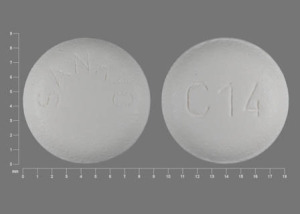Benicar Disease Interactions
There are 6 disease interactions with Benicar (olmesartan).
AR antagonists (applies to Benicar) angioedema
Major Potential Hazard, Moderate plausibility.
The use of these agents is contraindicated in patients with a history of angioedema related to previous angiotensin-converting enzyme (ACE) inhibitor or angiotensin II receptor blocker (ARB) therapy or in patients with hereditary angioedema. Patients with a history of angioedema unrelated to these agents may be at increased risk of angioedema while receiving angiotensin II receptor (AR) antagonists. Patients should be advised to immediately report any signs or symptoms suggestive of angioedema (swelling of face, extremities, eyes, lips, or tongue, or difficulty swallowing or breathing) and to stop taking the medication until otherwise directed by their physician. Emergency therapy and/or measures to prevent airway obstruction are required for angioedema involving the tongue, glottis, or larynx. Treatment with angiotensin II receptor (AR) antagonists should be discontinued permanently if angioedema develops in association with therapy.
AR antagonists (applies to Benicar) hypotension
Major Potential Hazard, High plausibility. Applicable conditions: Dehydration, hemodialysis, Hyponatremia
Angiotensin II receptor (AR) antagonists can cause symptomatic hypotension in patients with an activated renin-angiotensin system, such as volume- and/or sodium-depleted patients. Therapy with AR antagonists should be administered cautiously in such patients and in those predisposed to hypovolemic or hyponatremic states (e.g., patients on diuretic therapy, especially if high doses were used or if recently instituted; those on dietary salt restriction; renal dialysis patients). Volume and/or sodium depletion should be corrected prior to initiating therapy with AR antagonists, and the patient should be hemodynamically stable. Ideally, patients at risk for excessive hypotension should initiate AR antagonist therapy under close medical supervision, preferably with a lower dose, and followed closely for the first 2 weeks of treatment and whenever the dosage of AR antagonist or diuretic is increased.
AR antagonists (applies to Benicar) CHF
Moderate Potential Hazard, Moderate plausibility. Applicable conditions: Congestive Heart Failure
Angiotensin II receptor (AR) antagonists can cause renal impairment in patients whose renal function depends on the activity of the renin-angiotensin-aldosterone system. In addition, symptomatic hypotension can occur in susceptible individuals, which may compromise renal and myocardial perfusion. In patients with severe congestive heart failure (CHF), treatment with AR antagonists has been associated with oliguria and/or progressive azotemia and, rarely, renal failure, myocardial ischemia, and death. Therapy with AR antagonists should be initiated cautiously in patients with severe CHF, especially when accompanied by volume and/or sodium depletion. In patients who experience a decline in renal function, discontinuation of AR antagonist therapy is usually not required provided there is symptomatic improvement of the heart failure and renal deterioration is well-tolerated. Transient hypotension is also not a contraindication to further treatment with AR antagonists, since therapy can usually be reinstated without difficulty after blood pressure stabilizes.
AR antagonists (applies to Benicar) hyperkalemia
Moderate Potential Hazard, Moderate plausibility.
Drugs that inhibit the renin-angiotensin, such as angiotensin II receptor antagonist system can cause hyperkalemia. Concomitant use of these agents with drugs that increase potassium levels may increase the risk of hyperkalemia. Use caution when using these agents together and monitor serum potassium periodically.
AR antagonists (applies to Benicar) renal impairment
Moderate Potential Hazard, Moderate plausibility. Applicable conditions: Renal Dysfunction
Changes in renal function including acute renal failure can be caused by drugs that inhibit the renin-angiotensin system and by diuretics. Patients whose renal function may depend in part on the activity of the renin-angiotensin system (e.g., patients with renal artery stenosis, chronic kidney disease, severe congestive heart failure, or volume depletion) may be at particular risk of developing acute renal failure with these agents. Monitor renal function periodically in these patients. Consider withholding or discontinuing therapy in patients who develop a clinically significant decrease in renal function with these agents.
Olmesartan (applies to Benicar) renal/liver disease
Moderate Potential Hazard, Moderate plausibility. Applicable conditions: Renal Dysfunction, Biliary Obstruction
Olmesartan is eliminated unchanged in the urine and bile. After repeated dosing in patients with severe renal impairment (CrCl < 20 mL/min), the systemic exposure (AUC) was approximately tripled compared to subjects with normal renal function. In patients with moderate hepatic impairment, the AUC increased about 60% relative to that in matched controls. The manufacturer states that no initial dosage adjustment is necessary in patients with moderate to marked renal or hepatic impairment. However, patients should be monitored for undue adverse effects of the drug.
Switch to professional interaction data
Benicar drug interactions
There are 295 drug interactions with Benicar (olmesartan).
Benicar alcohol/food interactions
There are 2 alcohol/food interactions with Benicar (olmesartan).
More about Benicar (olmesartan)
- Benicar consumer information
- Check interactions
- Compare alternatives
- Pricing & coupons
- Reviews (116)
- Drug images
- Side effects
- Dosage information
- During pregnancy
- Generic availability
- Support group
- Drug class: angiotensin receptor blockers
- Breastfeeding
- En español
Related treatment guides
Drug Interaction Classification
| Highly clinically significant. Avoid combinations; the risk of the interaction outweighs the benefit. | |
| Moderately clinically significant. Usually avoid combinations; use it only under special circumstances. | |
| Minimally clinically significant. Minimize risk; assess risk and consider an alternative drug, take steps to circumvent the interaction risk and/or institute a monitoring plan. | |
| No interaction information available. |
See also:
Further information
Always consult your healthcare provider to ensure the information displayed on this page applies to your personal circumstances.


